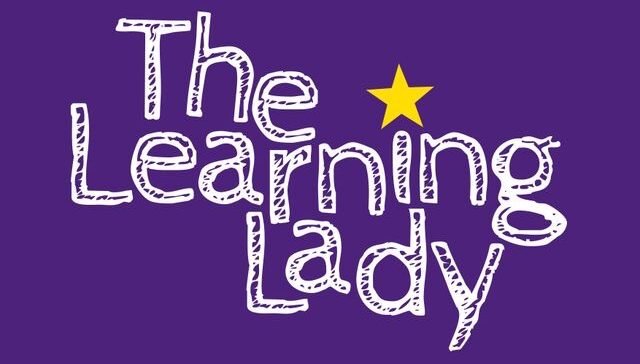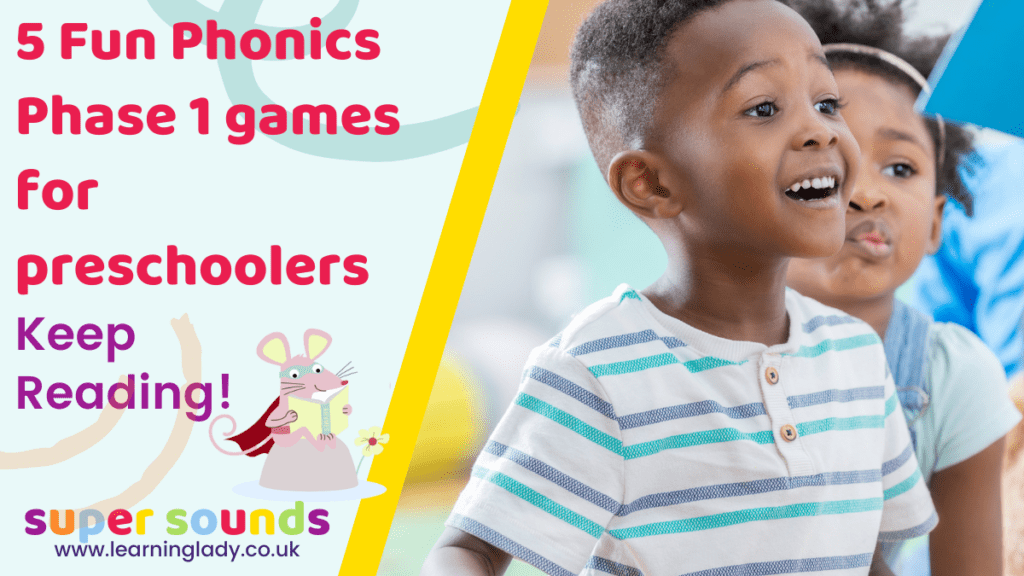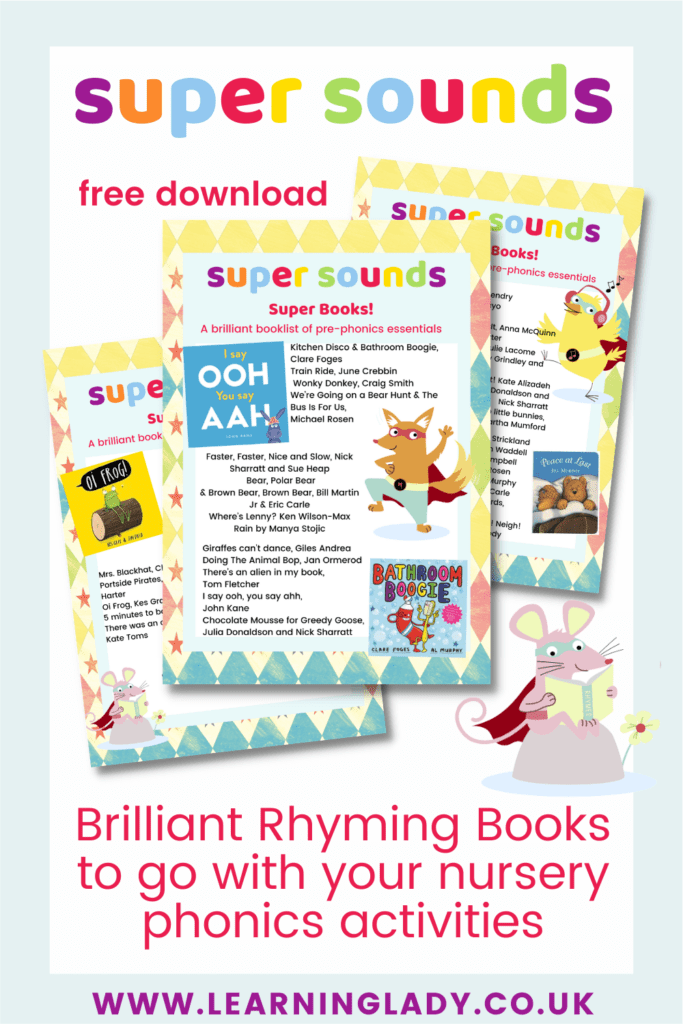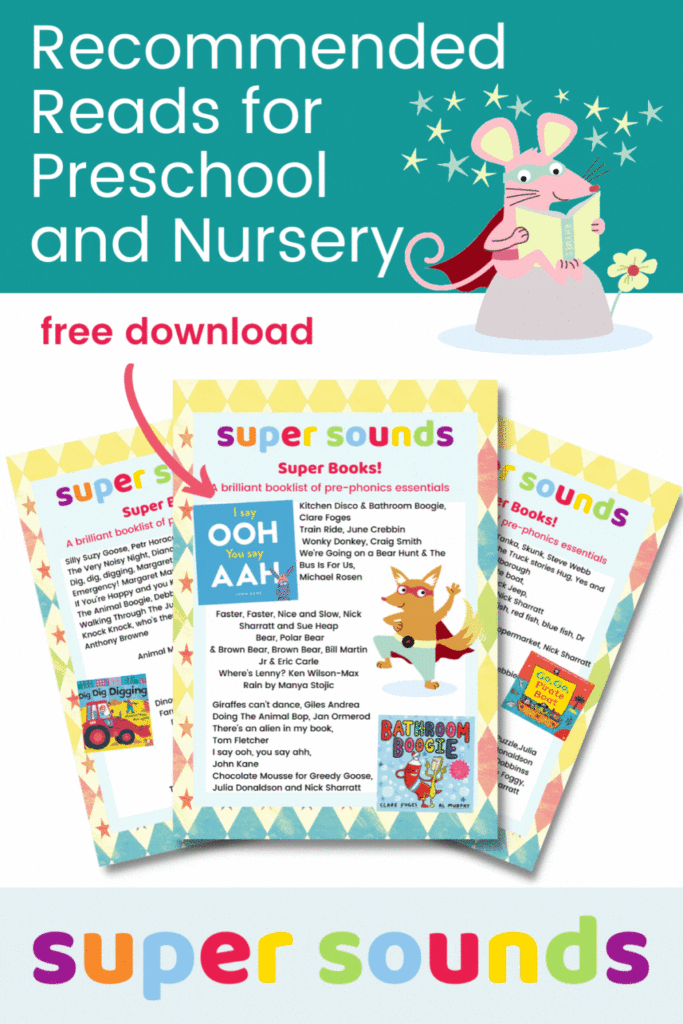Sharing Phonics Phase 1 games with Sarah!
Phonics Phase 1 games weren’t new to Sarah, she’d been playing games like ‘silly soup’ with her preschoolers for years! It had been so long that she couldn’t remember what she did before she used Letters and Sounds Phase 1.
Sarah’s team worked incredibly hard, and the children loved playing rhyming games. But Sarah was super honest, she knew that these could be improved.
Sarah needed new ideas fast!
We decided to look together at rhyming activities first. Sarah was keen to find some speedy, and fun solutions because, like most preschoolers, her preschoolers found this super challenging. .
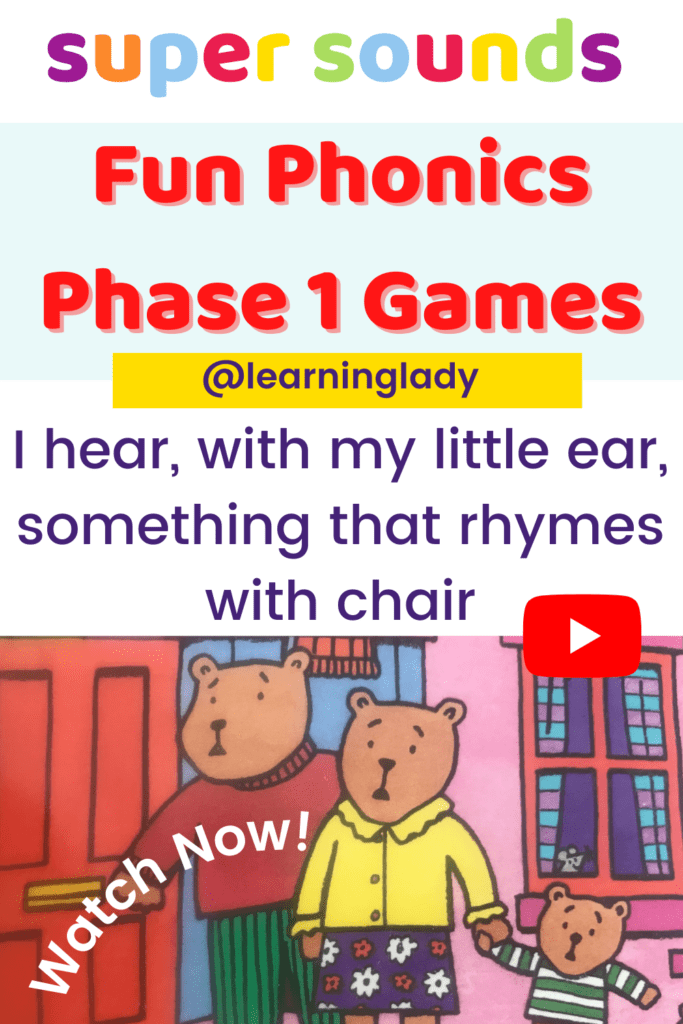
With the ambition to move beyond playing Silly Soup on repeat, this is the story of how 5 fun Phonics Phase 1 games inspired Sarah and the team to take a fresh look at teaching rhyme in preschool, with amazing results!
Building a new bank of rhyming books
Sarah and I began with books. The preschool had a range of rhyming books which we sorted into a basket. These would be the books that would be read and reread to children so that they could begin to hear and join in the rhymes on repeat.
There are so many rhyming books out there, and Sarah’s preschool had many that you’d recognise. To find out more about the rhyming books we used, and to get some instant inspiration, here’s a FREE Preschool Recommended Reads download. The perfect resource for anybody working with 2, 3, and 4-year-olds.
FREE resources for teaching Phase 1 Phonics
Funds were low in the preschool, and time was limited, so I recommended using as many everyday objects as we could.
The staff team and I made lists of rhyming pairs and rhyming sets of real objects to be used for Phase 1 Phonics games
We were really surprised that there were so many objects and toys that we could use for free!
Some examples included:
- A pen and a toy hen
- A sock and a padlock (from a suitcase)
- A jug and a mug
- A bell and a shell
- A garden gnome and a comb
Super cheap rhyme time resources
We also collected:
- 2 gift bags
- 2 foam dice
- A (magic) cloth
- A pretend microphone (this could be homemade)
One of the preschool staff also got the Slimy Rhymes game from a Mum’s market for 50p! This was a great hit with the children : )
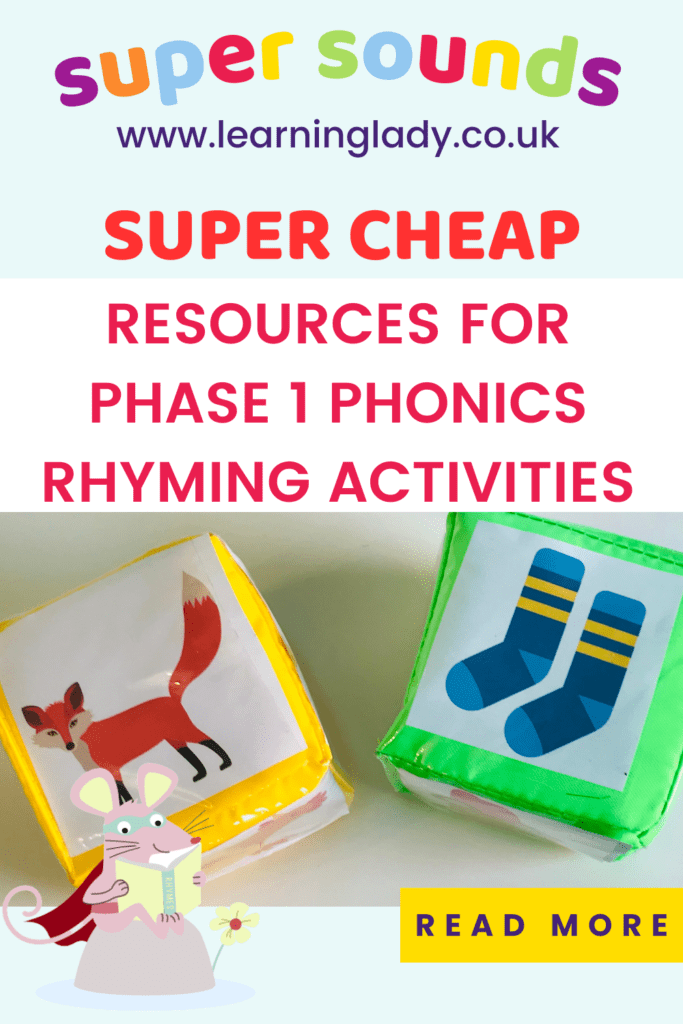
5 fun Phonics Phase 1 games that helped the children to rhyme and thrive!
All of the new Phonics Phase 1 games were taken from the Super Sounds book, being played in a small group. This first example is a simple rhyming pairs activity using the everyday objects we’d collected.
Phonics Phase 1 Games: Rhyming Bags of Fun!
What Sarah used :
- 2 gift bags (bag A and bag B)
- 5 rhyming pairs of real rhyming objects
- One object from each pair was placed into bag A, and one object from each pair into bag B.
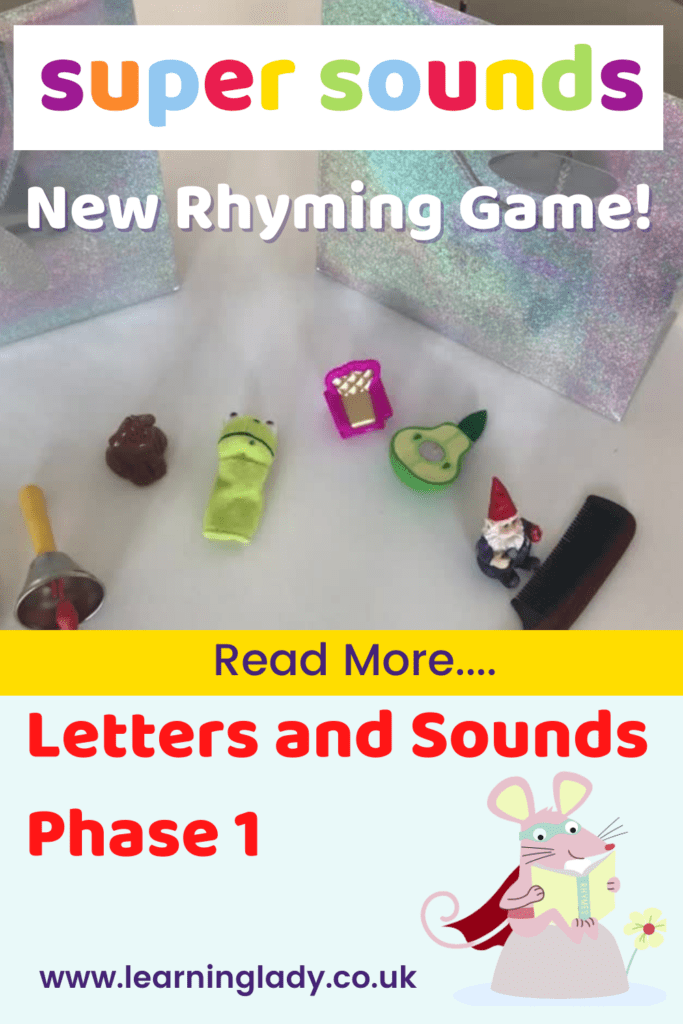
How to play
- Explain that the children are going to sort out the objects in the bags by matching the objects which rhyme.
- Give an example by taking 1 object from bag A, and 1 object from bag B as an example of 2 words which don’t rhyme.
d-og and r ope - Explain that these don’t rhyme because they have different endings.
- Put the objects back into bags A and B, then give an example of 2 objects which do rhyme.
d-og and fr-og - Explain that these do rhyme because they have the same -og ending.
- Take it in turns to take 1 object from bag A, and 1 object from bag B. Encourage all the children to try to work out if this is a rhyming pair by emphasising the ending of the words.
- If the pair rhymes, these can be removed from the bags and set aside.
- If the pair doesn’t rhyme, the objects need to be put back into bag A and bag B.
- Play continues until all the pairs have been matched.
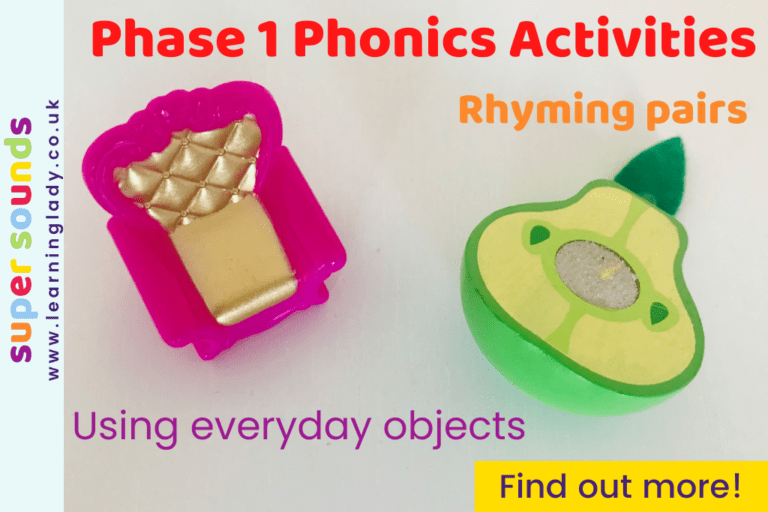
Phase 1 Phonics games: Rhyming dice
To maintain the children’s engagement in rhyming, Sarah was keen to try some more easy phase 1 phonics games to develop rhyme. The foam dice were used for this game, with some simple rhyming clip art images that Sarah found on the internet.
Phase 1 Phonics games: Magical Rhyming Words
As the children became more confident with matching rhyming pairs through these early phonics activities, it was time for the preschoolers to start working on larger rhyming sets. This simple phonics activity EYFS rhyming game taken from the Super Sounds book was a firm favourite with the preschoolers.
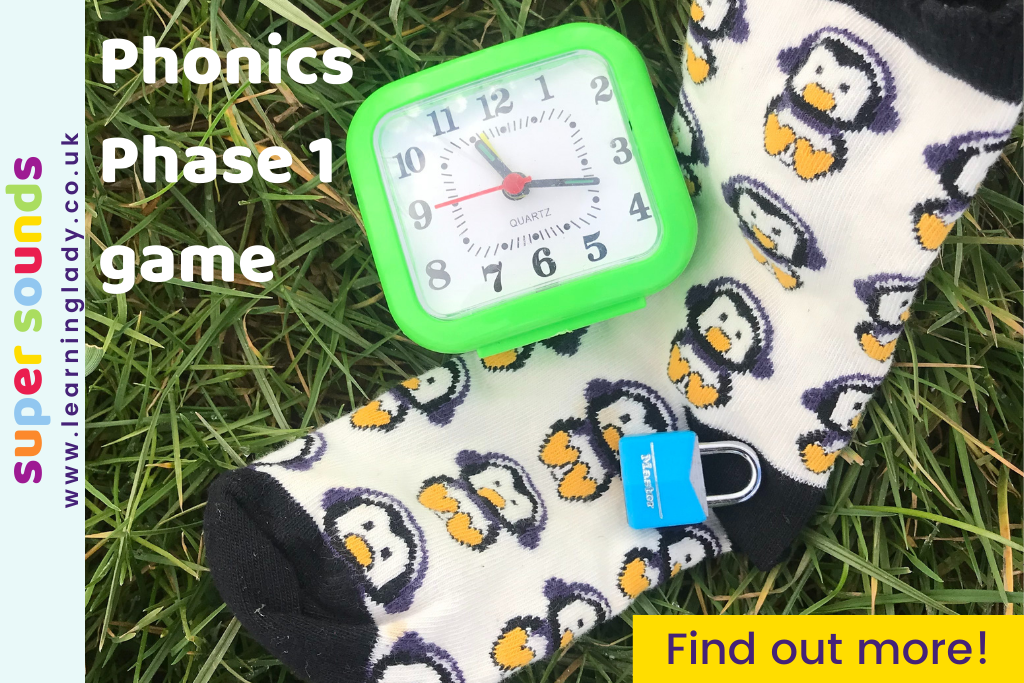
What Sarah used:
- A set of three rhyming objects
- A (magic) cloth to hide the objects
- Sarah also used a magic wand for extra magical fun!
How to play
- Explain that the children need to look carefully at the objects before you cast your magic spell, to make one of the objects disappear.
- Say all the words 4 times all together in a rhyming string to help the children remember.
“bug, jug, mug, plug, bug, jug, mug, plug” - Lay the magic cloth over the items, say some magic words, removing an object by grabbing it inside the cloth.
- Can the children guess what the missing object might be?
“bug, jug, ……, plug, bug, jug, …… plug” - When the children have offered their ideas, provide a big reveal so the children can check if they guessed correctly.
- Remove further objects one at a time or make it more challenging by removing two objects at a time as the children gain in confidence.
Phase 1 Phonics Games: Rhyming Rappers!
What Sarah used
- A 30 second / 1 minute timer
- Some sets of rhyming objects
- Microphone (real or homemade)
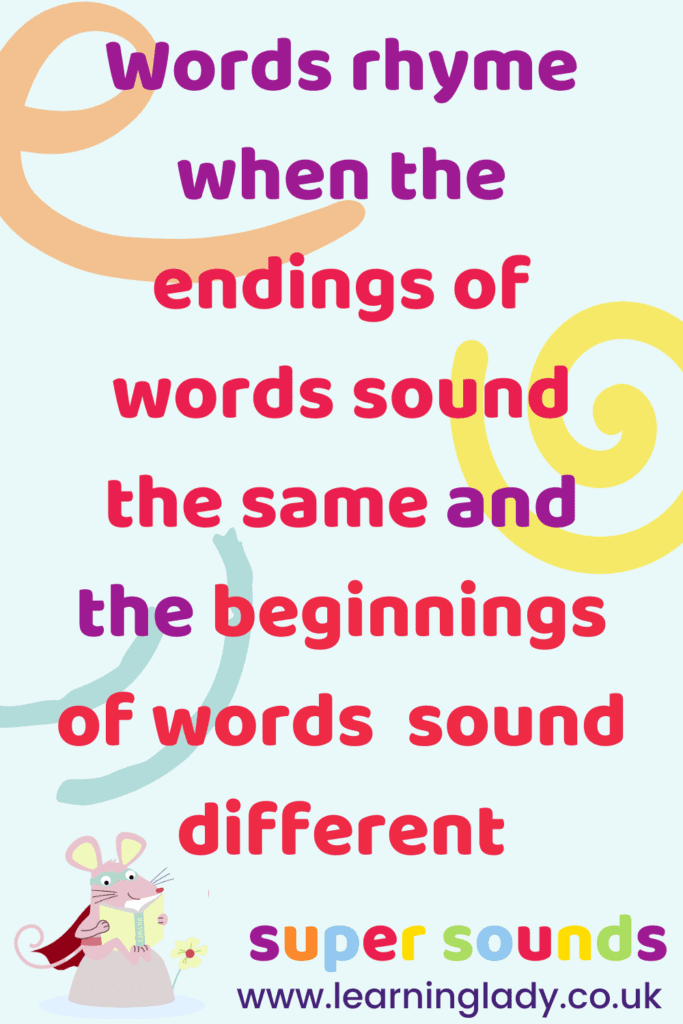
How to play
- Place a set of rhyming objects into the middle of the group. Name each of the objects all together, emphasising the end of the words to demonstrate how these words follow a rhyming pattern.
- Practise saying the rhymes by playing ‘my turn, your turn’, using the microphone.
- Explain that the children are going to be rhyming rappers, using the microphone in a race against the clock. The children are going to take it in turns to each say a rhyming word into the microphone, passing the microphone to the next person in the group as quickly as possible.
- The aim is to get all the way around the group so that everyone has had a turn at rapping, before the time runs out.
- Remind the children that they can use any of the real objects in the middle of the group for ideas, or they could use nonsense words.
- Start the timer and say the first word into the microphone, quickly passing the microphone to the first child . This child needs to continue by saying a rhyming word as quickly as possible before passing the microphone to the next child.
- Play continues in this way, rhyming and passing until the time runs out, or the microphone has been passed around the group and everyone has had a turn.
Phonics Phase 1 games: The odd one out!
As the children began to grow in confidence, Sarah finally began to play this odd-one-out game. This is a simple activity nursery children love as they begin to hear rhymes for themselves. Sarah used real objects from the collection to play this game, but you could also simply play along with this video.
Sharing Recommended Phase 1 Phonics books with families
To help families support the children in their rhyming journey, Sarah emailed a copy of the recommended reads list to all of the families. She also added this to the preschool website. Parents commented on how useful this was, especially with all of the instant clickable links!
Why not support your families by doing this too! You can download the Preschool Recommended Reads list here straightaway– and it’s FREE!
What was the impact of the new rhyming games?
Sarah and the preschool staff were delighted with the new fun Phase 1 Phonics ideas. The staff and children loved playing them together, and the preschooler’s ability to rhyme had improved dramatically
Sarah would never go back to playing Silly Soup ever again!
Find Out more about Phonics Phase 1 games for teaching rhyme:
Super Sounds by The Learning Lady
Ready for Reading with The Learning Lady
What comes before Phonics? by Sally Neaum
Fun Goldilocks and the three bears Rhyming game
